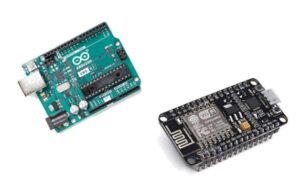Unveiling the Power of IoT Gateway: Revolutionizing Connectivity – Are you ready to dive into the world of the IoT gateway? If you’re looking to understand the inner workings of this groundbreaking technology and how it’s transforming the way we connect and communicate, you’ve come to the right place. In this comprehensive guide, we will explore the IoT gateway from every angle, unraveling its significance, applications, and potential impact on our daily lives.
What is an IoT Gateway?
At the heart of the Internet of Things (IoT) lies the IoT gateway, a pivotal component that bridges the gap between the physical and digital worlds. But what exactly is an IoT gateway? It’s a hardware device or software program that serves as the intermediary between IoT devices and the cloud. Think of it as the translator that enables seamless communication between your smart thermostat, fitness tracker, or any other IoT device, and the centralized cloud-based system where all the data is processed and analyzed.
An IoT Gateway is like a helper for making IoT devices talk to each other or to the internet. It’s usually a physical device with special software that does important jobs.
You can think of an IoT Gateway in a similar way to your home or office Wi-Fi router. Just like your router connects your devices and keeps them safe, an IoT Gateway does that too, but it also does some extra stuff.
IoT Gateways are like the air traffic controllers of the IoT world, ensuring that data flows smoothly, securely, and efficiently between devices and the cloud. This central hub plays a vital role in aggregating, processing, and transmitting data, making it an indispensable part of the IoT ecosystem.
What functions does an IoT gateway perform?
A versatile IoT Gateway may perform any of the following :
- Facilitating communication with legacy or non-internet-connected devices
- Data caching, buffering, and streaming
- Data pre-processing, cleansing, filtering, and optimization
- Some data aggregation
- Device to Device communications/M2M
- Networking features and hosting live data
- Data visualization and basic data analytics via IoT Gateway applications
- Short-term data historian features
- Security – manage user access and network security features
- Device configuration management
- System diagnostics
The Role of IoT Gateway in IoT Ecosystem
Understanding the role of IoT gateways within the broader IoT ecosystem is crucial to grasp the significance of this technology. Let’s break it down:
1. Data Aggregation and Filtering
IoT devices generate a massive amount of data, and not all of it is relevant or valuable. IoT gateways act as intelligent filters, sifting through the data to identify what’s essential and what can be discarded. This process ensures that only meaningful data is sent to the cloud for analysis, reducing the strain on network resources and speeding up decision-making.
2. Connectivity Management
IoT encompasses a wide range of devices with different communication protocols and standards. IoT gateways are equipped to handle this diversity by translating and managing these various protocols. This capability ensures that devices can communicate seamlessly with each other and with the central system.
3. Security and Encryption
Security is paramount in the IoT landscape. IoT gateways play a crucial role in securing data transmissions. They implement encryption and authentication protocols, safeguarding the privacy and integrity of the data being transmitted.
4. Local Processing
In some cases, it’s necessary to process data locally rather than sending it to the cloud. IoT gateways can execute specific tasks and logic, reducing latency and ensuring rapid responses in critical situations.
5. Offline Operation
IoT gateways can continue to operate even when connectivity is lost, ensuring that essential functions remain uninterrupted. This resilience is particularly vital in applications where downtime is not an option.
Applications of IoT Gateways
Now that we’ve delved into the core functions of IoT gateways, let’s explore the myriad of applications that benefit from this technology:
1. Smart Homes
In the era of smart homes, IoT gateways enable seamless integration of various devices like thermostats, security cameras, lights, and appliances. They ensure that your smart home functions as a unified, intelligent ecosystem, enhancing convenience and energy efficiency.
2. Industrial IoT (IIoT)
Industries are harnessing the power of IoT gateways to monitor and optimize machinery, predict maintenance needs, and improve overall efficiency. This leads to reduced downtime and significant cost savings.
3. Healthcare
IoT gateways are transforming healthcare by enabling remote patient monitoring, wearable health devices, and data-driven diagnostics. They empower healthcare providers to deliver more personalized and timely care.
4. Agriculture
In agriculture, IoT gateways assist in monitoring soil conditions, weather, and crop health. This data-driven approach allows farmers to make informed decisions, optimize resource usage, and increase crop yields.
5. Smart Cities
IoT gateways play a pivotal role in creating smart cities by enabling real-time monitoring of traffic, environmental conditions, and public services. This leads to improved urban planning and enhanced quality of life for residents.
6. Retail
Retailers utilize IoT gateways to track inventory, enhance the shopping experience, and implement location-based marketing strategies. This technology enhances customer satisfaction and increases operational efficiency.
IoT Gateways and Edge Computing
Edge computing distributes the load on a system by performing data processing at the data source, or “edge”, rather than relying on a central server for the bulk of the work. This is where an IoT Gateway comes in.
In edge computing, critical data processing is done at the data source rather than in a centralized cloud-based location. A versatile IoT Gateway assists edge computing in the field or on the plant floor. IoT Gateways that come equipped with these capabilities are referred to as ’Smart’ Gateways.
FAQs about IoT Gateways
Let’s address some common questions about IoT gateways:
How do IoT gateways enhance data security?
IoT gateways incorporate robust encryption and authentication mechanisms to ensure that data remains secure during transmission. They also implement access control policies to protect against unauthorized access.
Can IoT gateways operate offline?
Yes, IoT gateways can operate in offline mode, allowing devices to continue functioning even when internet connectivity is lost. This feature is crucial in applications where uninterrupted operation is essential.
Are IoT gateways compatible with various IoT devices?
Yes, IoT gateways are designed to be compatible with a wide range of IoT devices, regardless of their communication protocols and standards. They act as intermediaries, translating and facilitating communication between devices and the cloud.
What role do IoT gateways play in smart cities?
In smart cities, IoT gateways enable real-time monitoring of various parameters, such as traffic flow, air quality, and energy consumption. This data is then used to make informed decisions, optimize city services, and enhance the overall quality of urban life.
How do IoT gateways benefit the healthcare sector?
IoT gateways enable remote patient monitoring, allowing healthcare providers to collect and analyze patient data in real time. This technology improves patient care by enabling early detection of health issues and facilitating timely interventions.
Can IoT gateways be used in agriculture?
Yes, IoT gateways are valuable tools in agriculture. They help farmers monitor soil conditions, weather, and crop health, enabling data-driven decision-making and improving crop yields.
Conclusion
In the ever-evolving landscape of technology, IoT gateways stand as a crucial pillar of connectivity, enabling seamless communication between the physical and digital worlds. Their applications are diverse, from smart homes to industrial operations and healthcare. As the IoT ecosystem continues to expand, IoT gateways will play an increasingly vital role in shaping our connected future.
So, the next time you adjust your thermostat remotely or receive a notification from your smartwatch, remember that it’s the IoT gateway working diligently behind the scenes, making it all possible.
Explore the possibilities of IoT gateways, and embrace the future of interconnectedness. The IoT gateway is not just a piece of hardware or software; it’s the key to unlocking a world of opportunities and innovation.
Anupam M is blogging on this site on different aspects of technology, job, and business. He is an experienced IT professional with an Engineering degree from a premier NIT. Know more

